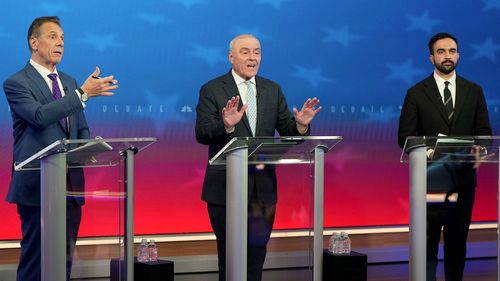Share this @internewscast.com
In the wake of his unexpected Democratic primary victory, 34-year-old democratic socialist Mamdani has been actively working to expand his support base. He aims to win over voters who might be uneasy about his critical stance on Israel’s government and his previous endorsements of progressive policies, like defunding the police. Meanwhile, his political opponents have been re-energizing their campaigns, hoping to chip away at his lead.
As the election approaches, here are seven key narratives to keep an eye on for Tuesday’s (Wednesday AEDT) vote:

Andrew Cuomo, the former governor, entered the mayoral race as the presumptive favorite, despite the cloud of sexual harassment allegations that led to his 2021 resignation. Though he has consistently denied these accusations, they cast a long shadow over his campaign.
Cuomo’s strategy banked heavily on his high-profile name and substantial donor backing, but he neglected to establish a robust grassroots campaign. This oversight contributed to his unexpected defeat in June’s Democratic primary at the hands of Mamdani.
Insiders from the Cuomo camp, speaking candidly albeit off the record, admit that their campaign strategy was flawed in several respects.
In contrast, Mamdani has been actively engaging with the community, including meeting with off-duty police officers. He has also been discussing his public safety agenda, which proposes significant changes to how the city addresses the needs of its most vulnerable citizens.

Democratic socialists were emboldened and started talking primary challenges
Mamdani pivoted from anti-police rhetoric
The mayoral candidate met with off-duty police officers and held meetings on the proposals in his public safety agenda, which would overhaul the way the city approaches its most vulnerable residents.

The Republican with many cats
New York City hasn’t had a Republican mayor since Michael Bloomberg left office in 2013.
Sliwa has campaigned by riding the subway and running on a tough-on-crime platform. He argued that his longtime ties to the city might help him reach voters who are otherwise opposed to Republican candidates.
To the end, he refused to withdraw from the race despite pressure from Cuomo and others who wanted to consolidate the anti-Mamdani opposition.
“When they come up to me, they don’t say, ‘Oh, the Republican,’” Sliwa told CNN.
“They don’t see me as a politician. They see me as one of them, which is rare.”

The diverse street at the centre of the race
Mamdani’s opponents criticised his support for decriminalising sex work, pointing to it as evidence that he is soft on crime.
Cuomo also hoped to use the issue to reach South Asian and Muslim voters.
Mamdani has clarified that he doesn’t support legalising sex work, but that he backs decriminalising the practice between consenting adults.
“I do not think that we should be prosecuting women who are struggling, who are currently being thrown in jail,” Mamdani said at a mayoral debate.

Many Jewish voters felt they had bad options
For many Jewish New Yorkers, the New York City mayoral election has become emotionally fraught.
Mamdani sought to reach out to Jewish New Yorkers, but the most recent pre-election polls still showed Cuomo drawing about 55 per cent of the Jewish vote.

A different kind of potential first lady
Instead, her influence was felt behind the scenes and on social media, where she promoted her artwork focused on Middle Eastern women and the plight of Palestinians in Gaza.











